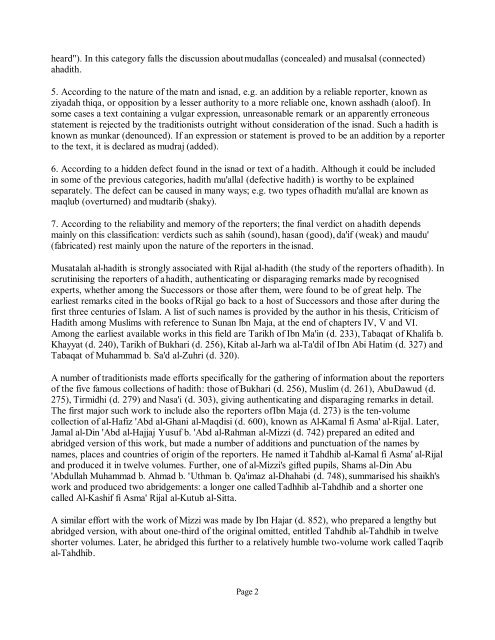Rules Governing The Criticism Of Hadith - Islam House
Rules Governing The Criticism Of Hadith - Islam House
Rules Governing The Criticism Of Hadith - Islam House
Create successful ePaper yourself
Turn your PDF publications into a flip-book with our unique Google optimized e-Paper software.
heard"). In this category falls the discussion about mudallas (concealed) and musalsal (connected)<br />
ahadith.<br />
5. According to the nature of the matn and isnad, e.g. an addition by a reliable reporter, known as<br />
ziyadah thiqa, or opposition by a lesser authority to a more reliable one, known as shadh (aloof). In<br />
some cases a text containing a vulgar expression, unreasonable remark or an apparently erroneous<br />
statement is rejected by the traditionists outright without consideration of the isnad. Such a hadith is<br />
known as munkar (denounced). If an expression or statement is proved to be an addition by a reporter<br />
to the text, it is declared as mudraj (added).<br />
6. According to a hidden defect found in the isnad or text of a hadith. Although it could be included<br />
in some of the previous categories, hadith mu'allal (defective hadith) is worthy to be explained<br />
separately. <strong>The</strong> defect can be caused in many ways; e.g. two types of hadith mu'allal are known as<br />
maqlub (overturned) and mudtarib (shaky).<br />
7. According to the reliability and memory of the reporters; the final verdict on a hadith depends<br />
mainly on this classification: verdicts such as sahih (sound), hasan (good), da'if (weak) and maudu'<br />
(fabricated) rest mainly upon the nature of the reporters in the isnad.<br />
Musatalah al-hadith is strongly associated with Rijal al-hadith (the study of the reporters of hadith). In<br />
scrutinising the reporters of a hadith, authenticating or disparaging remarks made by recognised<br />
experts, whether among the Successors or those after them, were found to be of great help. <strong>The</strong><br />
earliest remarks cited in the books of Rijal go back to a host of Successors and those after during the<br />
first three centuries of <strong>Islam</strong>. A list of such names is provided by the author in his thesis, <strong>Criticism</strong> of<br />
<strong>Hadith</strong> among Muslims with reference to Sunan lbn Maja, at the end of chapters IV, V and VI.<br />
Among the earliest available works in this field are Tarikh of Ibn Ma'in (d. 233), Tabaqat of Khalifa b.<br />
Khayyat (d. 240), Tarikh of Bukhari (d. 256), Kitab al-Jarh wa al-Ta'dil of Ibn Abi Hatim (d. 327) and<br />
Tabaqat of Muhammad b. Sa'd al-Zuhri (d. 320).<br />
A number of traditionists made efforts specifically for the gathering of information about the reporters<br />
of the five famous collections of hadith: those of Bukhari (d. 256), Muslim (d. 261), Abu Dawud (d.<br />
275), Tirmidhi (d. 279) and Nasa'i (d. 303), giving authenticating and disparaging remarks in detail.<br />
<strong>The</strong> first major such work to include also the reporters of Ibn Maja (d. 273) is the ten-volume<br />
collection of al-Hafiz 'Abd al-Ghani al-Maqdisi (d. 600), known as Al-Kamal fi Asma' al-Rijal. Later,<br />
Jamal al-Din 'Abd al-Hajjaj Yusuf b. 'Abd al-Rahman al-Mizzi (d. 742) prepared an edited and<br />
abridged version of this work, but made a number of additions and punctuation of the names by<br />
names, places and countries of origin of the reporters. He named it Tahdhib al-Kamal fi Asma' al-Rijal<br />
and produced it in twelve volumes. Further, one of al-Mizzi's gifted pupils, Shams al-Din Abu<br />
'Abdullah Muhammad b. Ahmad b. 'Uthman b. Qa'imaz al-Dhahabi (d. 748), summarised his shaikh's<br />
work and produced two abridgements: a longer one called Tadhhib al-Tahdhib and a shorter one<br />
called Al-Kashif fi Asma' Rijal al-Kutub al-Sitta.<br />
A similar effort with the work of Mizzi was made by Ibn Hajar (d. 852), who prepared a lengthy but<br />
abridged version, with about one-third of the original omitted, entitled Tahdhib al-Tahdhib in twelve<br />
shorter volumes. Later, he abridged this further to a relatively humble two-volume work called Taqrib<br />
al-Tahdhib.<br />
Page 2

















